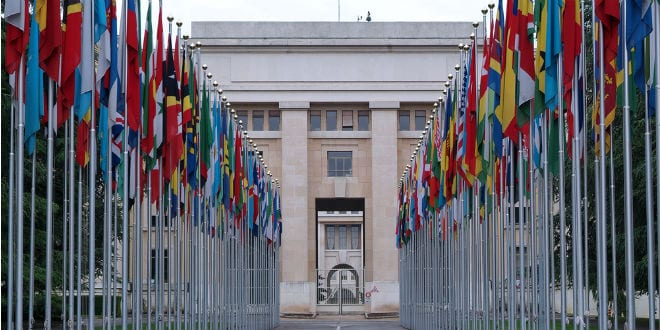After testifying at the United Nations below the Human Rights Council (UNHRC) plenary earlier this week, Joe Truzman, an expert on Palestinian militant groups active on the Gaza border with Israel, maintained that his own story shows the obvious pitfalls—and perhaps dishonest intentions—of the United Nations.
Truzman, native of a Portland, Ore., began following and researching militants groups in Gaza since the start of the 2014 Gaza war. Beginning as a hobby, Truzman learned how the militant factions operated in Gaza and about their presence on social media using open source data. Years later, Truzman has expanded his sources (about which he remains tightlipped) and has successfully infiltrated online groups in which Palestinian terrorists discuss their militant activity.
When protests on the Gaza border, deemed the “March of Return,” began on March 30, 2018, Truzman noticed major gaps between what he saw was happening at the border versus what was shown in the media and reported on in the U.N.’s Commission of Inquiry (COI).
Concerned that “the media isn’t getting the full picture,” Truzman jumped into action, finding pictures and videos showing inaccuracies in coverage, such as Palestinian border units that were active in attempting to infiltrate the security fence, launching incendiary and explosive-laden kites and balloons into Israel, and militants throwing grenades at the fence.
All the way from Portland, Truzman disproved major points in the recently released U.N. Human Rights Council report—namely, that many of the report’s “victims” shot by soldiers of the Israeli Defense Force were actually members of militant groups, including Hamas. Following are militants who Truzman showed were falsely characterized in the reports as “victims of IDF gunfire”:
Mahmoud Abu Taima: The U.N. report claims that Taima was killed approximately 150 meters from the fence, but the report failed to mention he was a fighter of Hamas’s military wing, Al-Qassam Brigades, as listed on one of their websites.
Abed Hawajri: The report notes that Hawajri was shot in the abdomen 150 meters from the fence, but neglects Hawajri’s affiliation with the Democratic Front for the Liberation of Palestine (DFLP). Hawajri was a field a commander in the DFLP’s military wing and was one of the founders of the ground in the Nusierat camp in Gaza. Video evidence shows that DFLP militants surrounded his funeral.
Jihad Abu Jamous: The Commission of Inquiry stated in its report that Jamous was shot in the head approximately 300 meters from the security fence, but did not mention that he was a militant in the Al-Aqsa Martyrs Brigades. Jamous was also a field commander of the al-Amoudi Brigade, a branch of the Al-Aqsa Martyrs Brigades.
Ahmed Sha’ar: Sha’ar was described in the commission’s report as a child killed by the IDF on May 14, 2018. Evidence from the Palestinian Islamic Jihad website reveals that Sha’ar was a fighter in Saraya al-Quds, the militant wing of Palestinian Islamic Jihad.
Truzman pointed out that he has other examples that he didn’t have time to mention in his address to the United Nations, including Naji Abu Hajir, who the Commission of Inquiry mentioned as a mechanic and killed by IDF gunfire. “There was nothing about him and his affiliation with Hamas’s military wing, Al-Qassam Brigades,” said Truzman. “It took me only a few minutes to find that he was a militant,” he added.
Despite having “solid evidence of militant activity at the border,” the media opted for the “peaceful civilian protesters killed by the IDF” narrative that was also adopted by the one-sided U.N. report on Israel’s “assault” on “civilian protesters” at the Gaza border.
Truzman concluded that the inquiry’s misleading identification of militants as civilian victims led to a skewed perception of the Israeli response. The report accused Israeli soldiers of “crimes against humanity” and called on the U.N. High Commissioner for Human Rights “to manage the dossiers on alleged perpetrators [IDF soldiers] to be provided to the International Criminal Court.”
The fact that he could disprove important facts in a major report from the comfort of his home with just a phone and a tablet within “a few weeks” became a red flag to Truzman that “something is definitely wrong” with the United Nations. Evidence the United Nations had that “should have changed their claims in the human-rights council’s report” were either “willfully ignored or they deemed it insufficient,” he said. “The U.N. should be an institution of reliability and honesty—none of which they are right now, especially regarding the COI’s ‘March of Return’ report.”
Truzman was not the only one to maintain that specific evidence was ignored by the United Nations. Col. Richard Kemp, former commander of British forces in Afghanistan, said, “I was one of the few—perhaps the only—independent military expert who gave evidence to the commission. Because my evidence did not fit with their anti-Israel agenda, it was ignored.”
Kemp posed that the U.N. Human Rights Council “never intended for their Commission of Inquiry to get at the truth about the violence on the Gaza border, hence the mandate given to it, which was blatantly and unashamedly skewed against the Jewish state.”
Moreover, he said, “failure to criticize or even accept Hamas’s role in inciting and organizing this violence” is not only “unfair” to Israel, it could set a dangerous precedent with real implications “encouraging further bloodshed and killing, in effect making it and the council an instrument of Hamas terrorism.”
The former commander welcomed the British Foreign Secretary’s re-affirmation on Thursday that the United Kingdom will vote against all Item 7 resolutions at the U.N. Human Rights Council, saying, “The U.N. Human Rights Council has proven time and again their implacable opposition to Israel, and this shapes so much of their work, including institutionalizing their day against Israel in the standing agenda Item 7—a form of victimization they impose on no other country.”
Source: Israel in the News

